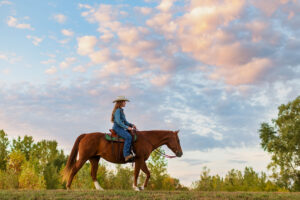Emergencies on the Trail
- Topics: Basic Care, Choke, Colic, Digestive Tract Problems, Diseases and Conditions, Exercise-Related Conditions, Exertional Rhabdomyolysis (Tying Up), First Aid, First Aid & Emergency Care, Hoof Care, Hoof Problems, Horse Care, Injuries & Wounds, Lameness, More Diseases & Conditions, Other Eye Problems, Poisoning & Toxicity, Sports Medicine, Trail and Recreational Riding

From lacerations to tendon sprains, here’s how to prevent and prepare for misfortunes far from home
You’re saddled up and ready to hit the trail on a beautiful spring day. Your horse is fit and ready to go. But we all know that when riding in the woods or out in the wilderness, things can go wrong—and usually when least expected. Therefore, it’s important to know the health and safety hazards you might encounter and be prepared to deal with an emergency. Here are some possible predicaments you might face.
Eye Injuries
When riding through the woods, your horse is at risk of getting smacked in the eye by a branch. If he’s squinting his eye or it’s tearing, he might have suffered a corneal abrasion. Or, if you’re riding out in a more open, arid region, windy conditions can stir up enough sand in the air to irritate the eyes and/or abrade the cornea. What can you do?
Heather Hoyns, DVM, of Evergreen Equine of Vermont, in West Windsor, recommends rinsing your horse’s eyes periodically with ophthalmic saline (available over the counter in the grocery store or pharmacy) as both a prevention and a treatment. Hoyns is an accomplished endurance rider and veterinarian with thousands of miles in the saddle over challenging trails throughout the United States. She also suggests adding to your first-aid kit a small tube of nonsteroidal ophthalmic ointment for lubricating injured eyes TheHorse.com is home to thousands of free articles about horse health care. In order to access some of our exclusive free content, you must be signed into TheHorse.com. Already have an account?Create a free account with TheHorse.com to view this content.
Start your free account today!
and continue reading.

Related Articles
Stay on top of the most recent Horse Health news with

















